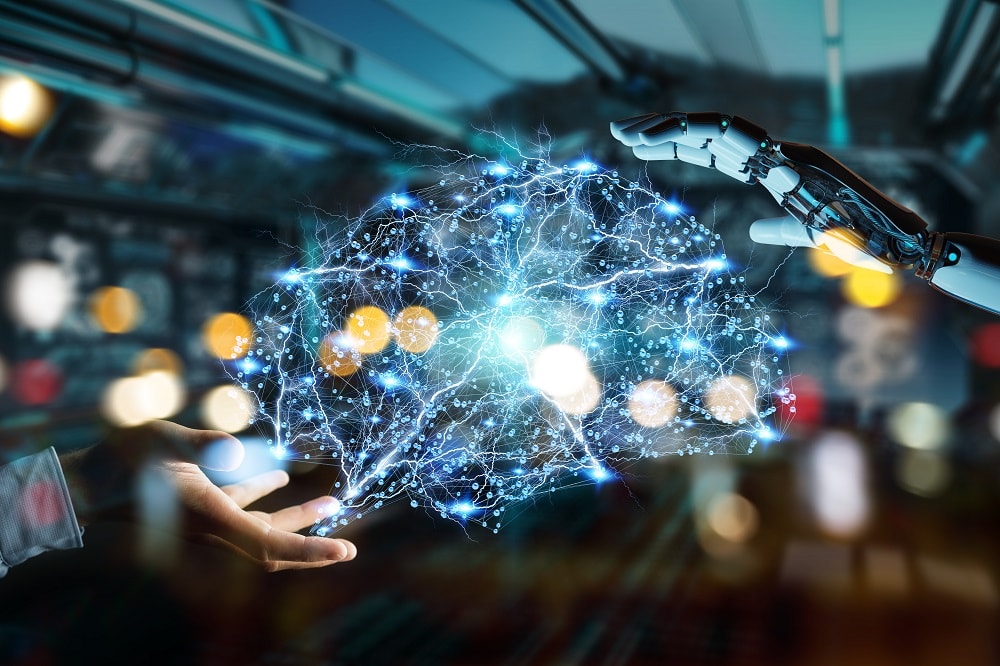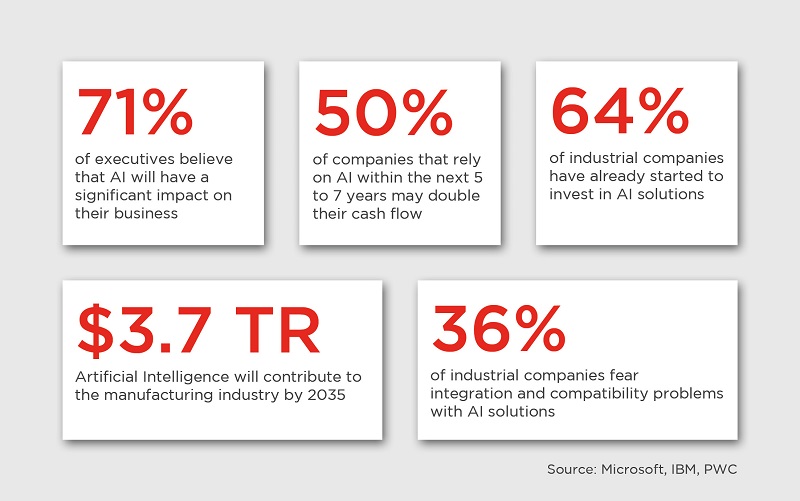
Artificial Intelligence (AI) + Industry 4.0: How Microsoft technology is bringing major changes to manufacturi …
Massive amounts of data on the one hand and cost pressure, disruptive innovations and more and more regulations on the other ? modern manufacturing faces challenges that can only be met by the smart use of Artificial Intelligence (AI).
AI equips manufacturing processes and systems with capabilities that can imitate human cognitive functions ? it provides them with intelligence. Equipped with these capabilities, manufacturing components can perceive their environment, imitate it, learn from data, make predictions and independently improve their own programming. Artificial Intelligence in manufacturing is key to intelligently connecting people, machines, products and data as well as to the smart and fast utilization of IoT (Internet of Things), cloud solutions, machine learning and predictive maintenance.
Facts and Figures

Characteristics
State-of-the-art AI processes an abundance of data using self-learning systems and ensures intelligent supply chains, process efficiency, higher added value and product quality, as well as safety and health at the workplace, preventive maintenance and automated diagnostics.
In addition, AI translates the data generated in the manufacturing processes into insights and recommendations for action, helping to make better operational and financial decisions. Typical areas of use for Artificial Intelligence in manufacturing processes include product development, production planning, quality control, machine maintenance, plant level, services, as well as safety and compliance.
Key technologies
AI for Industry 4.0 is comprised of some of the following technologies:?
- Advanced analysis techniques
- Predictive analysis
- Machine learning
- Image analysis
- Natural language processing
- Mood, behaviour and personality analysis
The 4 AI maturity stages of organizations
Microsoft’s AI Maturity Model describes four stages of maturity of companies with respect to Artificial Intelligence. The individual AI maturity stages differ in how firmly the topic of AI and digitization is linked to the corporate culture, what knowledge and experience is available in dealing with AI and how AI-friendly the corporate processes are already set up.
1st stage: Foundational
No knowledge about AI and how to approach it
Characteristics:
- Low digitization
- Basic analytical capabilities
2nd stage: Approaching
The possibilities of AI are known and there?s a desire to understand more
Characteristics:
- Digitization underway
- Optimization of processes desired
- Disruption unwanted
3rd stage: Aspirational
First experiences with AI have already been made
Characteristics:
- High digitization
- New business models desired
- Data-driven
4th stage: Mature
Strong skills in data science and technology
Characteristics:
- Monetizing digitization
- AI strategy in place
- Broad adoption of AI
- Deep expertise
*Source: Artificial Intelligence in Europe, Outlook for 2019 and Beyond (Microsoft)
Challenges
As important as it is to address the topic of AI and as tempting as the new possibilities are, companies must first look into their own AI maturity. Otherwise, there is a high probability that they will encounter unforeseen challenges during the transition to AI or during the process, which in the worst case could paralyze operations.
Before manufacturing companies can benefit from the advantages of artificial intelligence, several questions need to be answered. How do we deal with distortions in data and algorithms? How do we make complex algorithms and probabilistic recommendations understandable to those who use AI? How do we ensure that highly autonomous systems maintain human responsibility through meaningful human control? How do we regulate the ethical use of AI systems?
Advantages
The advantages of AI in manufacturing cover processes, people and production quality. Specifically, they include:
- Direct automation
- Smooth 24/7 production
- Refined root cause analysis
- Increased workplace safety
- Yield enhancement
- Safer workplace
- Improved production defect detection
- Lower operational costs
- Smarter workforce
- Higher supply chain efficiency
- Automated quality control
- Quick decision making
- Predictive maintenance
- Better product design
- Testing and quality optimization
- Better demand forecasting
Valuable insights with Microsoft AI
Microsoft Dynamics 365 AI technologies are paving the way for digital transformation in manufacturing. In our latest blog post, learn how to deploy Dynamics 365 for a transformation on your terms and with your requirements. Start removing data silos, get detailed insights and establish smart processes. Contact us today!




